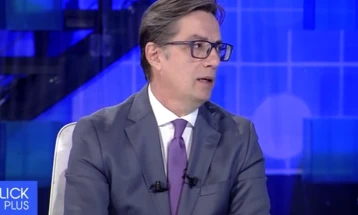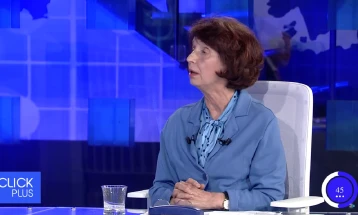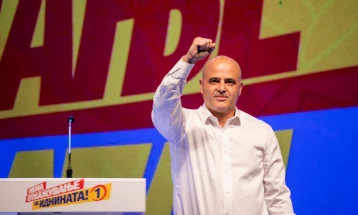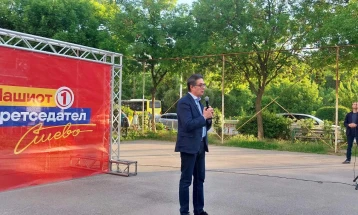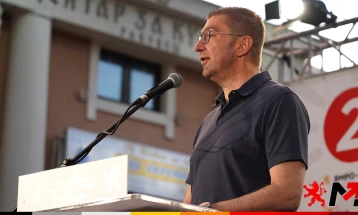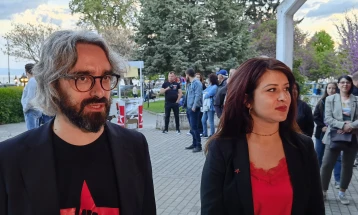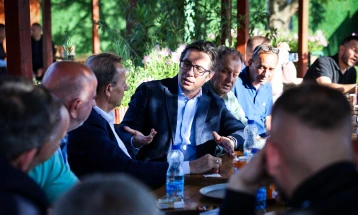VMRO-DPMNE to consolidate 61 MP seats, prefers coalition with ethnic Albanian opposition, Mickoski tells MIA
- VMRO-DPMNE leader Hristijan Mickoski says in an interview with MIA that coalition “Your Macedonia” will be the absolute winner at the May 8 parliamentary elections and will manage to consolidate 61 MPs while adding they prefer the ethnic Albanian opposition bloc as their coalition partner.
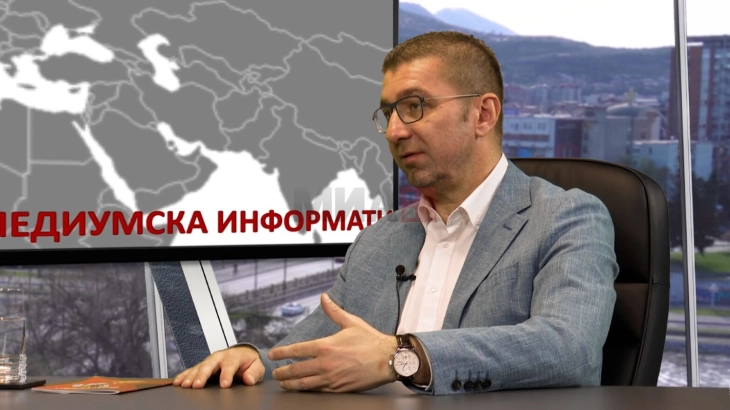
Skopje, 21 April 2024 (MIA) – VMRO-DPMNE leader Hristijan Mickoski says in an interview with MIA that coalition “Your Macedonia” will be the absolute winner at the May 8 parliamentary elections and will manage to consolidate 61 MPs while adding they prefer the ethnic Albanian opposition bloc as their coalition partner.
On a possible coalition with DUI, Mickoski says doors are never closed in politics but notes that the “Worth It” coalition would be given precedence.
- I believe that VMRO-DPMNE will be able to consolidate 61 MP seats after May 8. As a coalition ‘Your Macedonia’ will be the absolute winner. I cannot project the exact number now. Of course, we will invite a coalition partner due to the right of representation of smaller ethnic communities. Doors in politics are never closed but our priority is to enter into coalition with the ethnic Albanian opposition, says Mickoski.
Regarding the alignment of certain policies with the ethnic Albanian opposition, such as the constitutional amendments, the VMRO-DPMNE leader says talks have still not taken place since the current focus in the presidential and parliamentary campaigns.
“We are not focused on the negotiations. We have a clear programme ‘Platform 1198’, we have a clear reform agenda, a clear vision for Macedonia. This reform agenda includes all ethnic communities. This is not only about the Macedonians, a bit of reforms for them, then a bit for the Roma, the Turks or the Albanians. No, this is for all citizens. We believe we have a product that brings development in Macedonia,” says Mickoski.

In its programme, VMRO-DPMNE projects a GDP growth between three and five percent, drop of inflation from 3.7 to two percent, the budget deficit (from -3.6 to -2.9 percent), the unemployment rate (from 12 to 7.5 percent), public debt (from 63.8 to 59.7 percent) etc. Mickoski says the party’s economic team created the programme, in consultation with many people from the real sector, noting that a stable economic policy requires an efficient fight against corruption, “since the country is perceived as exceptionally criminalized, with no rule of law, which makes the businesses’ resistance to invest quite logical”.
On the election promise of creating 55,000 new jobs, he says talks have already taken place with friends who are part of investment funds, countries that he expects support and assistance from. When quizzed to reveal some of these states, Mickoski says the answer will come after May 8.
“We must secure funding if we want to create these 55,000 jobs, i.e. these funds must go into the business so that the real sector can create these jobs. Many people in the business sector say ‘we need people, we want to pay them, we have demands from our clients, but we are hesitant because we are uncertain in the business environment within the country’. Secondly, the rule of law is non-existent,” says Mickoski.
He says VMRO-DPMNE will ensure higher wages and pensions while maintaining low inflation rates. When asked where they would find the funds for the pensions’ increase, namely Mden 5,000 for every pensioner in the first year of their term, Mickoski says “these funds are already secured in our projects”.

Regarding corruption, he says Transparency International has placed the country on the 76th spot out of 180 countries.
“Our objective is to go into the top 50. Countering corruption requires politicians to contribute through their actions, first and foremost. Our laws are great, perfect, but one must act with sincerity, and no one should make concessions to anyone. There is no business in Macedonia that comes to me and says ‘you owe me because I helped you’. We chose the hard way because we knew that the day will come when VMRO-DPMNE will form the government,” says Mickoski.
Regarding the lack of support for the law on restrictive measures and the United States “blacklist”, he says the party cannot support something it was not consulted on, adding that VMRO-DPMNE supports everything in the framework of the Constitution and laws.
- I heard US Ambassador Angela Aggeler who says they have serious evidence. The first thing the next VMRO-DPMNE government will do is sit down and ask to see those evidence and also help with the evidence we have, so that other individuals from Macedonia are placed on the blacklist. Therefore, I expect this to be a two-way street, says Mickoski.
On the Criminal Code amendments that led to the expiry of the statute of limitations in many cases of the former Special Prosecutor’s Office, but also claims that VMRO-DPMNE provided tacit approval by ensuring the quorum for their adoption, Mickoski says the party had no benefit from those amendments.
“We must be clear about this. You say VMRO-DPMNE benefited. VMRO-DPMNE is charged in two cases – Talir 1 and Talir 2 – and the statute of limitations in both has not expired. VMRO-DPMNE’s assets have been frozen until this day. VMRO-DPMNE is the only political party I Europe that won elections with frozen assets and a blocked account. So, I cannot see the benefit for the party. If you refer to some of the cases where the statute of limitations has expired, you will see that those people were closer to the SDSM-DUI coalition over the past six-and-a-half years,” says Mickoski.
He says that if elected, they will draft a new Criminal Code in line with European practices, while noting that the dissolution of the Judicial Council and Council of Public Prosecutors would be done in order to fully remove political and partisan influence on the judiciary.
- There will be amendments to the law, deleting the part which says ‘the government nominates, the president nominates’, we will leave prosecutors and judges to elect people by themselves. We will ensure an independent budget, corresponding to the GDP, and the government will oversee the operations from a financial standpoint, in order to prevent any abuse. I do not know anyone in the Prosecutor’s Office, I do not know anyone in the judiciary, although many judges and prosecutors want to introduce themselves to me. They should choose their own. I don’t want to listen later on things like ‘this prosecutor is Mickoski’s, this judge is Mickoski’s’. I don’t want the government to nominate anyone, let them choose on their own. They have candidates in each of the appellate districts, let them choose the ones they believe are the best, compose their councils and work. The government will provide the budget and we will only ask that laws are observed. However, once I see political or business influence, we will stipulate severe penalties. The government will ensure independent functioning and operations. The only thing we ask is they prosecute and try in line with the law and the constitution, says Mickoski.
Regarding the Euro-integration process, the VMRO-DPMNE leader says they are prepared to talk to everyone because they have not been involved in the process until now. If they form a government, the opposition would be involved in the issue, while noting they remain on the position over delayed implementation of the constitutional amendments.
- I have not heard an argument by a European politician that trumps mine. If you refer to the dictate, this is it, I do not accept it. That is why we are saying delayed implementation of the constitutional changes, because no other country that joined the EU has ever done what we have. We have changed names, surnames, flag, framework agreement, other agreements for the sake of that European future, and they all said, ‘you should do only this and that is it, you will be an EU member-state’. Since you have not kept your word, this generation of politicians in VMRO-DPMNE does not intend to take this adventure. The guarantee is completion of the process of negotiations, because the conclusions do not read they should be effective now or the procedure should be finished. We have an option, a legal option. The ones who are saying this option is not there are lying. There are many countries, such as France, Hungary and others, where a delayed enforcement of the constitutional changes took place, says Mickoski.
He says there is no reason to include the Bulgarians in the Constitution at this moment.
“I am a cosmopolitan and have nothing against any citizen in Macedonia. But what is the reason to incorporate Bulgarians in the Constitution? Are the human rights of those several hundreds of Macedonian citizens who claim to be Bulgarian violated? Who is there to assess if someone’s rights are violated? There are 14 judgments in the Strasbourg-based European Court of Human Rights regarding the violation of the human rights of the Macedonian community in Bulgaria and zero judgments about the Bulgarian community in Macedonia. Therefore, it is not about someone’s human rights. Then why would we include them in the Constitution, when the document is very clear. It does not say that Macedonia is a country that observes the rights of the Macedonian, Albanian, Turkish, Serbian, Bosniak and Roma peoples, it reads others as well. Those others includes all other Macedonian citizens. I do not see any reason why we should do this now,” says Mickoski.
He also says the balancer (used for just representation of ethnic communities in public administration) would be cancelled, since the European Commission has also recommended it as a result of the screening process.

“EC recommends that the balancer is cancelled because it has served its purpose and is now causing more obstacles than producing an added value. We want to move forward and this sometimes requires brave decisions. This is a brave decision. If we want the country to focus on quality and not ethnocracy or particracy, then we should lead it in that direction,” says Mickoski.
He also refers to media freedom and hopes the country will continue to advance on the “Reporters without Borders” list, while adding this is not the only index.
“I do not think this is the only index. ‘Freedom House’ says otherwise when it comes to media, including pressure on media and journalists etc. Many media outlets have perished over the past six-and-a-half years. I never intend to enforce censorship, put pressure to publish something or not. Many lies have been written about me and I had to sue some media when they crossed the limit. I am not seeking for financial compensation, only the due apology, which some have already made for their lies and slander. I am aware that we, politicians, must be more tolerant and I have been tolerant to the maximum. But, there are some media that target families and attack without any reason whatsoever,” says Mickoski.
Asked if he will work on solving MIA’s status by adopting a specific law that regulates the agency’s operations, the VMRO-DPMNE leader says he is informed about the ongoing activities.
“There was a debate on MIA as well. MIA’s future will depend on MIA itself. It should not depend on any government or a person. The goal is for the agency to be objective, quoted by others, credible,” underlines Mickoski.
Ana Cvetkovska
Translated by Ivan Kolekjevski
Photo: MIA
Video and editing: Andrej Brankovikj and Vladimir Rabasovikj

